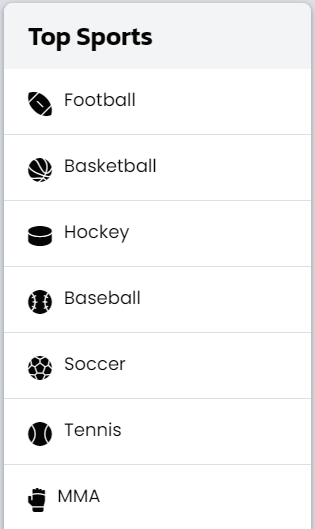Explore the thrill of sports betting with legal online bookmakers across the United States. Find the perfect bookmaker for your state on US Bookies, your guide for American gambling.
Discover exclusive registration offers, in-depth reviews, and the latest sports betting news.
-
BetMGM Sports
Exclusive Offer: Get a 20% Deposit Match up to $1,600 in Sports Bonus!21+. Gambling problem? Call 1-800-GAMBLER. AZ, CO, IA, IL, IN, LA, KS, KY, MA, MD, MI, NC, NJ, OH, PA, TN, VA, WV, WY. Call 877-8-HOPENY or text HOPENY (467369) (NY). Call 1-800-327-5050 (MA). 21+ to wager. Please Gamble Responsibly. Call 1-800-NEXT-STEP (AZ), 1-800-522-4700 (KS, NV), 1-800-BETS-OFF (IA), 1-800-270-7117 for confidential help (MI). Participant must complete the Wagering Requirements and satisfy the (10x) playthrough requirement. Visit BetMGM.com for Terms & Conditions. Visit site -
Caesars Sportsbook
Get up to $1,000 Back in Bonus Bets if Your First Bet Doesn't Win!Must be 21 or older and physically present in AZ, CO, IL, IN, IA, KS, KY, LA, ME, MA, MD, MI, NJ, NC, NY, OH, PA, TN, VA, WV, or WY. New users only. Must register using eligible promo code. First bet after registration must qualify. Max. Bonus Bet: $1,000. Bonus Bet expires 14 days after receipt. Void where prohibited. See Caesars.com/promos for full terms. Know When To Stop Before You Start.® Gambling Problem? CO, IL, KY, MD, NJ, OH, TN, VA, WV, WY, KS (Affiliated with Kansas Crossing Casino), LA (Licensed through Horseshoe Bossier City and Harrah’s New Orleans), ME (Licensed through the Mi’kmaq Nation, Penobscot Nation, and Houlton Band of Maliseet Indians, federally recognized tribes located in the State of Maine), PA (Affiliated with Harrah's Philadelphia): If you or someone you know has a gambling problem, crisis counseling and referral services can be accessed by calling 1-800-GAMBLER (1-800-426-2537) or MD: visit mdgamblinghelp.org or WV: visit 1800gambler.net; AZ: Call 1-800-NEXT-STEP; IN: Call 1-800-9-WITH-IT; IA: Call 1-800-BETSOFF; MI: Call 1-800-270-7117. ©2023, Caesars Entertainment Gambling Problem? Call 1-800-GAMBLER MA: CALL 1-800-327-5050 or visit gamblinghelplinema.org NY: Call 877-8-HOPENY or text HOPENY (467369) Visit site -
FanDuel Sportsbook
Bet $5 Get $150 in Bonus Bets!New players only, 21+. Gambling Problem? Call 1-800-GAMBLER. Available in AZ, CT, CO, IA, IL, IN, KS, KY, LA, MA, MD, MI, NJ, NY, PA, OH, TN, VA, VT, WV, WY only. Full T&C apply. Visit site -
DraftKings Sportsbook
Bet $5, Get $200 instantly in Bonus Bets! (+ Get a No Sweat NBA SGP Every Day of NBA Playoffs)New users only, 21+. Available in AZ, CO, IA, IL, IN, LA, MI, NJ, NC, NY, PA, TN, VA, WV, WY only. Deposit bonus issued as site credits. Full T&C apply. Visit site
Welcome to Us Bookies
Navigate through US bookmakers, offering money lines, parlay bets, live in-play betting, and more. As the industry expands, choosing the right bookmaker becomes crucial. US-Bookies assists you in making informed decisions, providing insights into the best online sportsbook bonuses and valuable sports betting tips.
Partnered with reputable and legal online bookmakers, US-Bookies ensures accurate reviews tailored to the evolving landscape of regulated betting in different states. Explore your state’s options and kickstart your online betting journey today.
Partnered with reputable and legal online bookmakers, US-Bookies ensures accurate reviews tailored to the evolving landscape of regulated betting in different states. Explore your state’s options and kickstart your online betting journey today. Interested in welcome offers and bonus codes? Check out our in-depth reviews of top platforms like BetMGM, Fanduel, and BetRivers to find exclusive deals and promotions.
Spotlight on the NFL Draft
The NFL Draft is set to take place in Detroit, Michigan, from April 25th to April 27th. This year, there are a lot of talented quarterbacks, with Caleb Williams and Jayden Daniels leading the pack. It’ll be intriguing to see if both of them catch the eye of the Chicago Bears and Washington Commanders, the two teams holding the first picks.
Additionally, the draft offers plenty of betting opportunities. For instance, aside from the standard ‘who will be drafted in the first round’ wagers, FanDuel provides odds on various aspects such as the first player selected for each position, the position of the team’s first drafted player, and even which team will select the most impactful players.
Is Sports Betting Legal in the US?
Map Key:
Green – State has online or retail sports betting.
Blue – Sports betting is legal here but there are no facilities or platforms.
Yellow – Sports betting legislation is on the table.
Grey – No sports betting opportunities or legislative actions.
Sports betting is now legal in America, BUT it depends on what state you are in. The Professional and Amateur Sports Protection Act (PASPA) was repealed by the Supreme Court in May 2018.
Now states have the chance to allow sports betting as they see fit. That means they can choose to allow online sportsbooks or retail bookies and even mobile apps.
Once, sports betting was a gray area. It was quite common for states to allow in-person betting at horse racing tracks and fantasy sports teams can usually be made with real cash.
Unlocking Your Options: Betting Choices in Online US Sportsbooks
The United States is pretty new to the sports betting world. What are the types of things punters have access to?
Well, it really depends on what you’re looking for and which online sportsbook you choose to register with.
Almost all bookmakers cover the big leagues, the NFL, NBA, MLB, and the NHL are sure to be major features at most, if not all American bookmakers.

Other betting favorites sure to be included are big events like the Olympics, tennis matches, horse racing, and soccer as well as NASCAR.
But if you’re interests are more narrow, you’ll still be able to find what you want with a little extra research. Sports like lacrosse, billiards, and rugby all have carved out niches on certain betting platforms. You can calculate your betting profits with our tool.
No matter your preference, sort by state to see which online bookmakers are active where you live and then check out the reviews to help you find what you’re looking for.
Also, check out one of our many “How to” guides. We’ve got information on reading odds and how to place bets on all the most popular sports and leagues.
In sports wagering, it pays to be prepared with good knowledge, knowing how to place smart bets, and finding great bonuses.
Online Bookmakers Welcome Bonuses
But before you can activate a bonus for online sports betting, like the BetMGM bonus code, there may be certain requirements and conditions to be fulfilled. Read about them here so you can know what to expect when signing up to sports bet online.

You must register for a betting account at the horse racing book prior to activating any bonus.

A bonus code will likely be required to be typed in during the registration process to activate the bonus. Not typing in the code may result in the loss of the bonus.

Wagering requirements may be in place which means a certain amount of money must be wagered on the site before the bonus money turns into ‘real’ money.

A time limit may apply to the wagering requirements which means you must turn over a set amount of money within a specific time frame. Money not turned over will be forfeited.
US Betting Legislation – Details
You saw earlier basic information about US states with some sort of betting and gambling legalized. If you’re interested in more detailed information about the current status of betting and gambling legislation in your state, please refer below.
States That Allow Online/Retail Sports Betting
Review the current status of online and retail sports betting legality in various states across the United States. The table below outlines states where these forms of sports betting are permitted.
| State | Online Sports Betting | Retail Sports Betting |
|---|---|---|
| Arizona | ✅ | ✅ |
| Arkansas | ✅ | ✅ |
| Colorado | ✅ | ✅ |
| Connecticut | ✅ | ✅ |
| Delaware | ✅ | ❌ |
| District of Columbia | ✅ | ✅ |
| Florida | ✅ | ✅ |
| Illinois | ✅ | ✅ |
| Indiana | ✅ | ✅ |
| Iowa | ✅ | ✅ |
| Kansas | ✅ | ✅ |
| Kentucky | ✅ | ✅ |
| Louisiana | ✅ | ✅ |
| Maine | ✅ | ✅ |
| Maryland | ✅ | ✅ |
| Massachusetts | ✅ | ✅ |
| Michigan | ✅ | ✅ |
| Mississippi | ✅ | ❌ |
| Montana | ✅ | ❌ |
| Nebraska | ✅ | ❌ |
| Nevada | ✅ | ✅ |
| New Hampshire | ✅ | ✅ |
| New Jersey | ✅ | ✅ |
| New Mexico | ✅ | ❌ |
| New York | ✅ | ✅ |
| North Carolina | ✅ | ❌ |
| Ohio | ✅ | ✅ |
| Oregon | ✅ | ✅ |
| Pennsylvania | ✅ | ✅ |
| Rhode Island | ✅ | ✅ |
| South Dakota | ✅ | ❌ |
| Tennessee | ✅ | ✅ |
| Vermont | ✅ | ✅ |
| Virginia | ✅ | ✅ |
| Washington | ✅ | ❌ |
| West Virginia | ✅ | ✅ |
| Wyoming | ✅ | ✅ |
States That Allow Online/Retail Casinos
Navigate the regulatory landscape of online and retail casinos across the United States with the following table, highlighting states where these casino experiences are legally available.
| State | Online Casinos | Retail Casinos |
|---|---|---|
| Alabama | ❌ | ✅ |
| Arizona | ❌ | ✅ |
| California | ❌ | ✅ |
| Colorado | ❌ | ✅ |
| Connecticut | ✅ | ✅ |
| Delaware | ✅ | ✅ |
| Florida | ❌ | ✅ |
| Idaho | ❌ | ✅ |
| Illinois | ❌ | ✅ |
| Indiana | ❌ | ✅ |
| Iowa | ❌ | ✅ |
| Kansas | ❌ | ✅ |
| Louisiana | ❌ | ✅ |
| Maine | ❌ | ✅ |
| Maryland | ❌ | ✅ |
| Massachusetts | ❌ | ✅ |
| Michigan | ✅ | ✅ |
| Minnesota | ❌ | ✅ |
| Mississippi | ❌ | ✅ |
| Missouri | ❌ | ✅ |
| Montana | ❌ | ✅ |
| Nebraska | ❌ | ✅ |
| Nevada | ❌ | ✅ |
| New Jersey | ✅ | ✅ |
| New Mexico | ❌ | ✅ |
| New York | ❌ | ✅ |
| North Carolina | ❌ | ✅ |
| North Dakota | ❌ | ✅ |
| Ohio | ❌ | ✅ |
| Oklahoma | ❌ | ✅ |
| Oregon | ❌ | ✅ |
| Pennsylvania | ✅ | ✅ |
| Rhode Island | ✅ | ✅ |
| South Dakota | ❌ | ✅ |
| Texas | ❌ | ✅ |
| Virginia | ❌ | ✅ |
| Washington | ❌ | ✅ |
| West Virginia | ✅ | ✅ |
| Wisconsin | ❌ | ✅ |
| Wyoming | ❌ | ✅ |
Coming Soon: States That Will Allow Sports Betting in the Future
- Maine
- Florida
- North Carolina
- Vermont
States With no Plan to Start Sports Betting
- Alabama
- Alaska
- Hawaii
- Idaho
- Nebraska
- North Dakota
- South Carolina
- Utah
Wrapping up on Online Bookmakers in the USA
The legalization of sports betting in America has been a long-fought war. The repeal of PASPA was a big victory for sports enthusiasts, a whole new form of entertainment has opened up! Online bookmakers are going to be competing for a slice of the market. That should mean top-quality services for customers.
When you hear the news that sports betting is coming to your state, keep your ear to the ground about mobile sports betting or online bookmakers, not just retail sports betting. You might get in the door early on some signup offers, bonus cash, or promo codes.
US-Bookies will help new sports bettors take the first step into the online world. And don’t forget to read our content about sports insights and betting guides to help you make the smartest bets possible!
Betting Guides
Formula 1 Odds & Tips
So, now that you can bet on sports in many…
Moneyline Betting Explained
Moneyline betting is pretty straightforward and involves betting on who…
How To Read Odds
Understanding how to read betting odds is key to successful…
How to Bet on Soccer
Are you a soccer fan? You know all about the…
How to Bet on Baseball 2024
The new MLB season starts on March 19 and will…
How to Read Football Odds
The 2024 Super Bowl is coming. That means you will…









